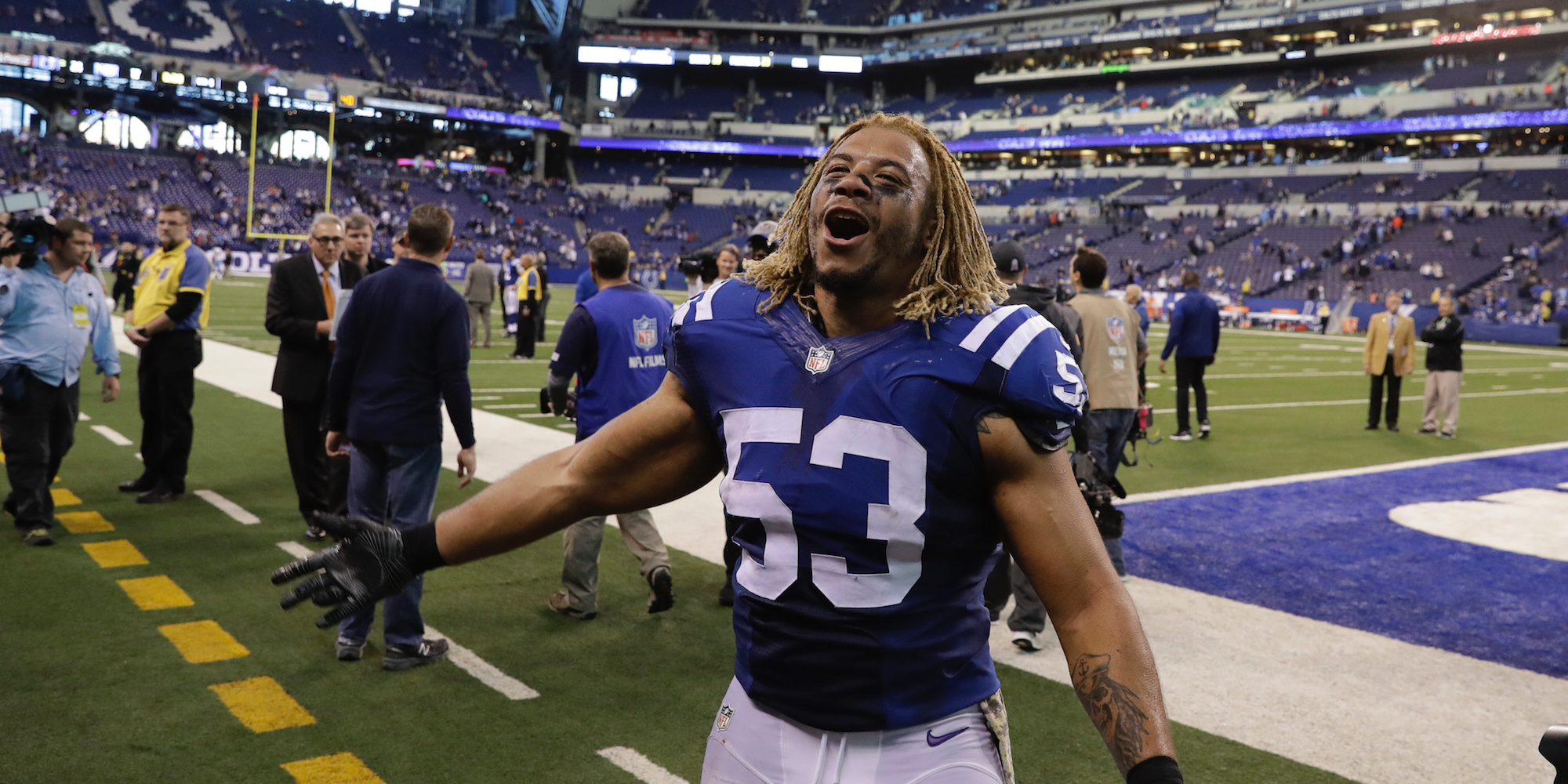- The death of Indianapolis Colts linebacker Edwin Jackson has reignited the immigration debate after authorities revealed that the suspected drunk driver who killed him was an unauthorized immigrant.
- The suspect, Manuel Orrego-Savala, is a twice-deported Guatemalan national whose blood-alcohol level was nearly three times the legal limit when he allegedly struck Jackson and an Uber driver.
- President Donald Trump and prominent Republicans weighed in, calling for increased border security and a crackdown on illegal immigration.
President Donald Trump again used a prominent death allegedly caused by an unauthorized immigrant to call for a crackdown on illegal immigration on Tuesday.
“So disgraceful that a person illegally in our country killed @Colts linebacker Edwin Jackson,” he tweeted. “This is just one of many such preventable tragedies. We must get the Dems to get tough on the Border, and with illegal immigration, FAST!”
Jackson, 26, and his Uber driver Jeffrey Monroe, 54, were killed early Sunday morning as they stood outside their car pulled over on an Indianapolis highway. Police said 37-year-old Manuel Orrego-Savala, whose blood-alcohol level was nearly three times the legal limit, fatally struck them.
The deaths took on national significance after authorities revealed that Orreg-Savala was a twice-deported Guatemalan national with a prior criminal conviction in the US.
Trump was far from the only Republican to weigh in. Rep. Todd Rokita of Indiana tweeted that Jackson's death "should make all Americans angry," and called for a border wall and an "end to illegal immigration."
The Republican National Committee, too, seized on Jackson and Monroe's deaths as evidence that increased security along the US-Mexico border is necessary.
"Their lives were taken by a twice-deported illegal immigrant who was not only two times the legal limit to drive, but attempted to flee the scene of the crime in a cowardly fashion," Michael Joyce, spokesman for the Indiana RNC, said in a statement to The Indianapolis Star. "These horrific events only further underscore the need for immigration reform and stronger border security measures that can further prevent these tragedies from happening in the future."
But Jackson's roommate said he thought Jackson wouldn't want his death politicized.
"Absolutely not. He would not want that," Chad Bouchez told CBS News. "I don't think Edwin would have judged anyone on where they were from or anything else."
The driver's criminal and immigration history

Orrego-Savala is a Guatemalan national who Immigration and Customs Enforcement believes entered the US illegally in July 2004, spokeswoman Nicole Alberico told The Indianapolis Star.
He was convicted of driving under the influence in 2005, and ICE arrested him over living in the country illegally in October 2006. He was deported to Guatemala in January 2007.
Orrego-Savala then made his way back to the US, where ICE arrested him again in March 2009, and deported him for the second time that May.
It's unclear when Orrego-Savala entered the US for the third time, and when he arrived in Indiana.
He has not yet been charged in Jackson and Monroe's deaths, but is being held in the Marion County Jail and is due for an initial hearing Wednesday morning.
State police investigators are working with federal immigration officials, who have placed an immigration hold on Orrego-Savala, according to CBS News.
The case could have implications for the ongoing immigration debate in Congress over so-called Dreamers, young unauthorized immigrants whose fate is up for negotiation. The Trump administration rescinded the Deferred Action for Childhood Arrivals program, which shields Dreamers from deportation.
Trump has demanded that any deal protecting the Dreamers include his long-promised wall along the US-Mexico border, as well as several major changes to the legal immigration system. Bipartisan groups of lawmakers have proposed several possible deals, and Trump has rejected two of them.
Echoes of the Kate Steinle case

The incident is reminiscent of another recent, prominent case involving the death of an American at the hands of an unauthorized immigrant.
Throughout his presidential campaign, Trump used the death of San Francisco woman Kate Steinle at the hands of a Mexican national to call for an end to so-called "sanctuary cities."
The culprit in Steinle's death, Jose Ines Garcia Zarate, was acquitted by a jury last December of murder and manslaughter charges.
Steinle's death and Garcia Zarate's acquittal set off a political firestorm over illegal immigration and sanctuary policies.
Trump and his allies insisted that San Francisco's policies of limiting cooperation with federal immigration authorities contributed to Steinle's death. Garcia Zarate had been deported from the US five times since the early 1990s and had a lengthy criminal history.
Proponents of sanctuary cities, however, argued that federal authorities were the ones who had erred in Garcia Zarate's case by transferring him into local custody rather than to ICE.
They also argued that San Francisco's policies are necessary in ensuring that immigrant communities feel safe reporting crimes without fear that contacting local law enforcement will lead to their deportation.

